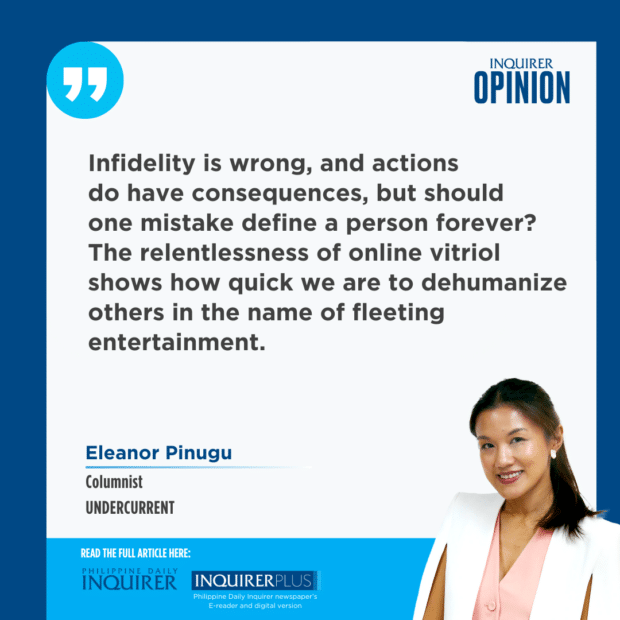Why are we eager to shame women?

Last week my online feed and group chats were largely dominated by discourse about a single topic. No, it wasn’t updates about the nonexistent Mary Grace Piattos nor the sudden declaration of martial law in South Korea. Instead, I found myself catching up with hundreds of messages about a local young actress allegedly ensnaring her love team partner away from his scorned ex-girlfriend, who had posted screenshots of their private conversations to prove the affair’s existence.
The actress’ name immediately went viral on X and other platforms, as she quickly became the target of memes, crass remarks, and contemptuous statements—branding her a cheater, promiscuous, and other far worse derogatory terms. In stark contrast, the young actor involved in the controversy faced significantly less backlash. While netizens excitedly dissected her sexually suggestive messages, even creating pop quizzes about them, the most prominent criticism of him was his claim of doing “method acting” to justify his actions.
The unequal condemnation of the actress highlighted how women are often vilified for behaviors that society condones—or even celebrates—when exhibited by men. And such double standards—as we see in the case above—are most glaring in the context of sexual behavior.
From adolescence, young men are often encouraged to explore sexual relationships as a rite of passage while young women are taught to protect their “purity.” As adults, women continue to face harsher judgment for expressing sexual agency, while men with active sex lives are often glorified. Terms like “stud” or “player” elevate men, while labels like “slut” and “easy” degrade women. This phenomenon, known as “slut-shaming,” reflects society’s tendency to criticize and punish women for perceived sexual assertiveness.
What is even more disturbing is that women are not only recipients of slut-shaming, we are also perpetrators of it. Psychologists believe that slut-shaming could partially be attributed to an evolutionary bias where women who are perceived to be too sexually assertive are seen as threats to social order. Apart from being perceived by other women as unfair competition as in romantic situations, they are also seen as potential disruptors of loyalty and stability within a group. By slut-shaming, these women are socially penalized and compelled to get in line. The researchers concluded that the outrage it triggers is often justified by people under the guise of upholding moral values. In truth, the only thing it accomplishes is effectively controlling a woman’s behavior through condemnation. Women who experience slut-shaming are found to have increased levels of anxiety, depression, and diminished self-esteem.
On the other hand, research shows that men with multiple sexual partners are often perceived as virile and, therefore, ideal mates. As a result, society also tends to excuse men for what is supposedly a socially unacceptable behavior. For instance, despite laws against it, many men manage to maintain having “two families” simultaneously without facing significant repercussions. Men who fathered multiple kids are seen as matinik. Women in similar situations are often shunned and stigmatized.
This unfair bias becomes quite problematic in rape cases, wherein the blame often falls upon female victims (with questions on what they were wearing, whether they were dancing in a sexually suggestive manner, or whether they did something that might have “tempted” the perpetrator. The abusers on the other hand are easily given empathy by the public, often citing that “boys will be boys.” In contrast, very few will stop to ask how the victims will forever carry the pain, trauma, and most likely shame from that experience.
Five days after the scandal broke, the actress issued a public apology, explaining that she was unaware her partner was still in a relationship. Yet, the jokes, memes, and hateful comments about her show no signs of letting up, illustrating just how much more enduring and amplified the nature of shaming could be due to digital platforms, compounding the emotional and professional harm it can inflict on a person. Infidelity is wrong, and actions do have consequences, but should one mistake define a person forever? The relentlessness of online vitriol shows how quick we are to dehumanize others in the name of fleeting entertainment.
What is even more telling is society’s selective outrage. Why is the public more eager and vigilant to condemn a young woman in her late 20s for a personal mistake than demand accountability from an FBI most-wanted cult leader accused of using religion to sexually traffic and abuse girls and women? This inconsistency exposes a society that claims to champion gender equality yet continues to uphold double standards that disproportionately punish women.
If there is any silver lining to this issue, it is the growing number of voices challenging the unfair treatment the actress is enduring. While these may not yet silence all the mockery and hateful posts, they offer hope that more people will begin to question the biases ingrained in our culture and recognize our own role in perpetuating them. Perhaps next time, there will be more who will choose to pause, reflect, and resist the urge to take part in shaming women.
—————-
eleanor@shetalksasia.com




















